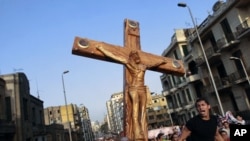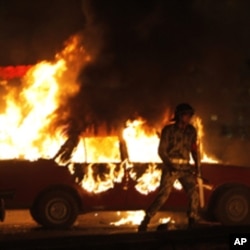As Egypt's Copts bury their dead from Sunday's violence in Cairo, members of the interim civilian Cabinet have offered to resign. But the move is unlikely to lessen the anger that has spread beyond the Christian community and is aimed at the country’s military leadership.
Deputy Prime Minister Hazem el-Beblawi is reported to have offered his resignation to protest the government’s handling of the violence Sunday, the worst since the popular uprising earlier this year toppled President Hosni Mubarak. It was not immediately clear if the resignation was accepted.
Criticism of the interim civilian Cabinet has been growing. The chairman of the opposition Wafd party, Sayyid Badawi, says the Cabinet has been largely ineffectual.
Badawi says the current government has been unable to solve many problems.
|
Egypt's Coptic Christians Say Equality Demands Not Met
|
He is demanding it be replaced by what he calls a government of national salvation.
But to many other anti-government protesters, these short-term politicians are beside the point. The real leadership, they argue, remains the Supreme Council of the Armed Forces. And they want it gone.
Coptic protesters are denouncing the military leader, Mohammed Hussein Tantawi, in no uncertain terms. “The people,” they chant, “want the field marshal to hang.”
It is a stark change from a battle cry of Egypt’s uprising, when demonstrators called out that “the people and the army are one.” Today, those people are angry, suspicious and shocked, after an initially peaceful demonstration Sunday turned violent, leaving 26 people dead. The head of the Coptic church, Pope Shenouda, has called for a three day fast to mourn the victims, most of them Christians.
Few among them are persuaded by official promises to investigate the violence. Luka Darwish is a Muslim student who has been protesting alongside Coptic Christians against the Supreme Council of the Armed Forces, or SCAF.
“The government and the SCAF have to go. That's it. It's done. It's obviously that they are counterrevolutionaries," said Darwish. "They are against the revolution."
The military rulers have been slow to enact promised reforms. Most seem to come only after intense protests or riots. Copts, for example, have been asking for changes to religious laws that hinder the building of churches and don’t recognize the conversion of Muslims to Christianity. Only after Sunday’s violence has the SCAF said it will move quickly on Coptic concerns.
Hala Mustafa, the editor of Democracy magazine in Cairo, says by nature, the military rulers are conservative and old habits die hard.
"This is the legacy of the past because it has been the same policy for the last 30 years and I think some of the old state establishments are acting the same way, like nothing happened, like we didn’t pass through the 25th of January movement," said Mustafa.
But one of the few things that Egypt's new rulers have changed in the last eight months is to end the suppression of Islamist groups, the more extreme of which have launched attacks on minority Christians. And it is that change, Mustafa believes, that should make the military rulers act on the Coptic demands.
"This is the most important thing in order to enhancing and imposing the concept of citizenship with no discrimination. So I think this is something that should be adopted, otherwise I think that the sectarian tensions will continue," Mustafa added.
No matter how long it takes to transfer to true civilian rule - election dates have been repeatedly pushed back - Mustafa warns of the possible alternative if the issue of religious equality is not addressed. Many of the sectarian battles witnessed in the region, she notes, have their roots in just such discrimination.
















